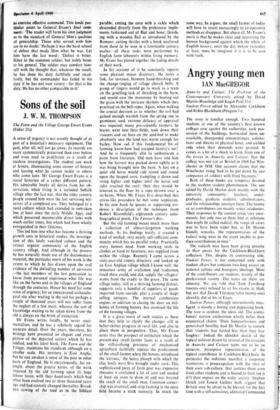• Knight's tale
JOHN TERRAINE
There is a difficulty in writing about Field- Marshal Slim which, fortunately, does not often afflict the military historian. It is simply that one has to be such an unusually good writer in order to do half as well as Slim has done himself. Slim on Slim is going to be, I am afraid, not the last but the best word for a long time. Slim on much else besides. This is hard luck on Sir Geoffrey Evans; - within the limits of that hard luck, and within the limits of a series which does not permit an author to spread himself, he has done a workmanlike job.
It is a weakness of the 'Great Commanders' series that there is never room to examine the foundations of greatness—the formative early experiences of a man's life—in sufficient depth. Sir Geoffrey Evans, like other authors, has had to concentrate on one episode, and he has chosen the great double battle of Imphal- Kohima (March-June 1944) as his centre- piece_ It is hard to quarrel with this decision although, again for reasons of length, Slim's 'finest hour,' the victory of Mandalay-Meiktila the following year, seems by comparison rather rushed.
On Imphal-Kohima General Evans i very good. His summary of Slim's conduct of the battle is excellent: `By virtue of its strategical, tactical and logistical complexity, it demanded a display of the highest qualities of general- ship, particularly a mental capability to absorb a quick succession of shocks and surprises, a calm confident judgment in the face of im- pending disaster, a resolution not to allow the enemy to dictate and a capacity accurately to sum up the endurance of one's own soldiers and those of the enemy.'
That was Slim's contribution to the turning- point of the war in Burma; the combat narra- tive explaining how he made it is terse but always clear. But the real eloquence of Moral Evans's book is reserved for the passages in which he describes the conditions in which the war was fought: the nightmare terrain, the monsoon, the food problem, disease. 'There were instances of battalions being reduced to a fighting strength of one company; out of a patrol of 140 men of a British battalion, 70 per cent contracted malaria and one brigadier protested when ordered to send out a patrol for several days because there was no quinine, pointing out the futility of the operation since, within a week, the men would be carrying one another.'
All these are elements which cause the mili- tary historian, in tranquility, to thank God that he only has to write about them. General Evans was one of the men who had to face them. Slim had to overcome them, in order so exercise effective command. This lends par- ticular point to General. Evans's final com- ment: 'The reader will form his own judgment as to the standard of General Slim's qualities of generalship. Those who served with him are in no doubt.' Perhaps it was the hard school of defeat that made Slim what he was. Let him have the last word: 'Defeat is bitter. Bitter to the common soldier, but trebly bitter to his general. The soldier may comfort him- self with the thought that, whatever the result, he has done his duty faithfully and stead- fastly, but the commander has failed in his dyty if he has not won victory—for that is his duty. He has no other comparable to it.'



































 Previous page
Previous page